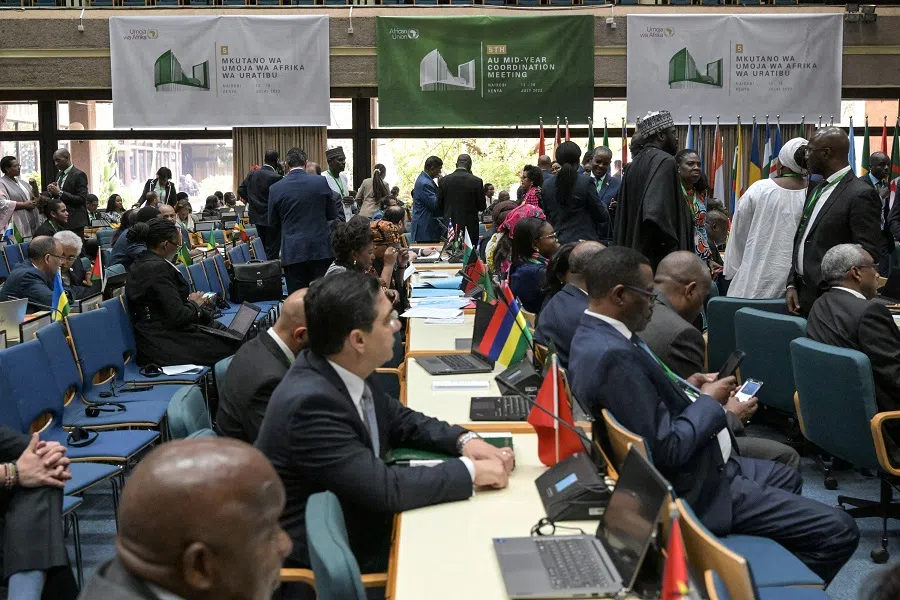Young Chinese are making their presence felt in Africa's Kenya
Young Chinese Wang Hao shares his personal experience of working in Africa's Kenya. He says a growing number of young Chinese are venturing into Africa for exchanges, internships and full-time work. In this era of globalisation, it is important that young Chinese communicate with the outside world to develop a broader worldview and seek opportunities for growth.

Due to work, I had the opportunity to be based in Kenya, some 8,000 kilometres away from China. Kenya is one of the more developed countries in Africa and the third largest economy in Sub-Saharan Africa. Its capital Nairobi is known as the "little Paris of Africa", and many multinational corporations have set up their African headquarters there.
Following growing economic and trade relations between China and Kenya in recent years, China has become Kenya's top trading partner. In the local community, I have also met many Chinese entrepreneurs who have settled down in Kenya and are engaged in the fields of tourism, trade and real estate. They hope to prosper locally, riding on Kenya's rapid economic development and China's huge market demand and industrial capacity.
As a young person myself, I quickly met a large number of Chinese youths in the area.
Nairobi is also one of four main United Nations (UN) secretariat duty stations and where the global headquarters of the UN Environment Programme and the UN Human Settlements Programme are situated. Thus, on top of economic and trade exchanges common in African countries, Nairobi also offers a unique window to China's participation in the multilateral system.

As a young person myself, I quickly met a large number of Chinese youths in the area. Most of them, about a dozen or so, are working or interning at the local UN offices. They came from a variety of backgrounds; some were sent by Chinese ministries, while others joined after passing the UN's exam for young professionals. Most were here to participate in the UN's summer internship programme; some of them also received support for internships and full-time work from Chinese universities, education departments or the China Scholarship Council.
Benefits of working overseas
There are three impressive points about these youths serving in an international organisation. First, they have a broad outlook on the world and are well-adapted to cross-cultural working and living environments; most have gone on exchange programmes or studied overseas. At parties and events attended by multinational colleagues, they shared anecdotes on communicating with colleagues from different backgrounds, tips on upward management and career management, and passion for or complaints about working life.
Second, their experience in China gives them an edge in the workplace. For instance, they may now share their personal experiences with others regarding China's expanding new energy sector and digital economy.

Third, they are always energetic and enthusiastic. While this is certainly related to their age, having the courage and passion to venture to an unfamiliar continent is a "screening process" in itself - Chinese youths capable of making such a decision naturally have a pioneering spirit.
In our chats, everyone agrees that there is a growing number of Chinese youths heading to Nairobi for exchange programmes and internships with international organisations. This is not just a short-term phenomenon following the relaxation of Covid-19 measures; foreign friends who have worked at the local UN office for many years have also taken notice of the trend.
...and there has always been a severe skill gap in China for participation in international organisations and global governance.
Factors in going overseas
The opening up and development of China's economy and education to the outside world are the natural macro drivers. However, the fact that there is a great need for China and the rest of the world to work together to address global concerns cannot be overlooked, and there has always been a severe skill gap in China for participation in international organisations and global governance.
This has prompted China's universities, education departments, the China Scholarship Council and other relevant institutions to spring into action. For example, Tsinghua University, which is at the forefront of this mission, proposed in 2016 the goal of cultivating top-level innovative talent with "global competency".
In Africa, such measures are having an impact. After years of effort, an increasing number of Chinese youths are emerging as a new force participating in global governance.
However, this only accounts for 1.1% of the UN's total personnel, which is far from enough considering China's financial contribution, economic size, and population in comparison to other big nations.

In the future, it can be foreseen that Chinese youths will have a more substantial presence in international organisations. In fact, according to employee data published on the UN's official website, the UN employed 1,564 Chinese nationals in 2022, up from 1,235 in 2018, an increase of nearly 28% - the fastest growth rate among major powers. However, this only accounts for 1.1% of the UN's total personnel, which is far from enough considering China's financial contribution, economic size, and population in comparison to other big nations.
However, growth in numbers is just a one-dimensional indicator. What's more important is how to effectively respond to global issues such as climate change and AI governance amid an era of great flux, and how to actively promote collaboration and mitigate conflict in a geopolitically tense environment. The world is watching to see how capable, wise and collaborative China's younger generation is.
This article was first published in Lianhe Zaobao as "在肯尼亚遇见中国青年力量".



![[Big read] When the Arctic opens, what happens to Singapore?](https://cassette.sphdigital.com.sg/image/thinkchina/da65edebca34645c711c55e83e9877109b3c53847ebb1305573974651df1d13a)
![[Video] George Yeo: America’s deep pain — and why China won’t colonise](https://cassette.sphdigital.com.sg/image/thinkchina/15083e45d96c12390bdea6af2daf19fd9fcd875aa44a0f92796f34e3dad561cc)
